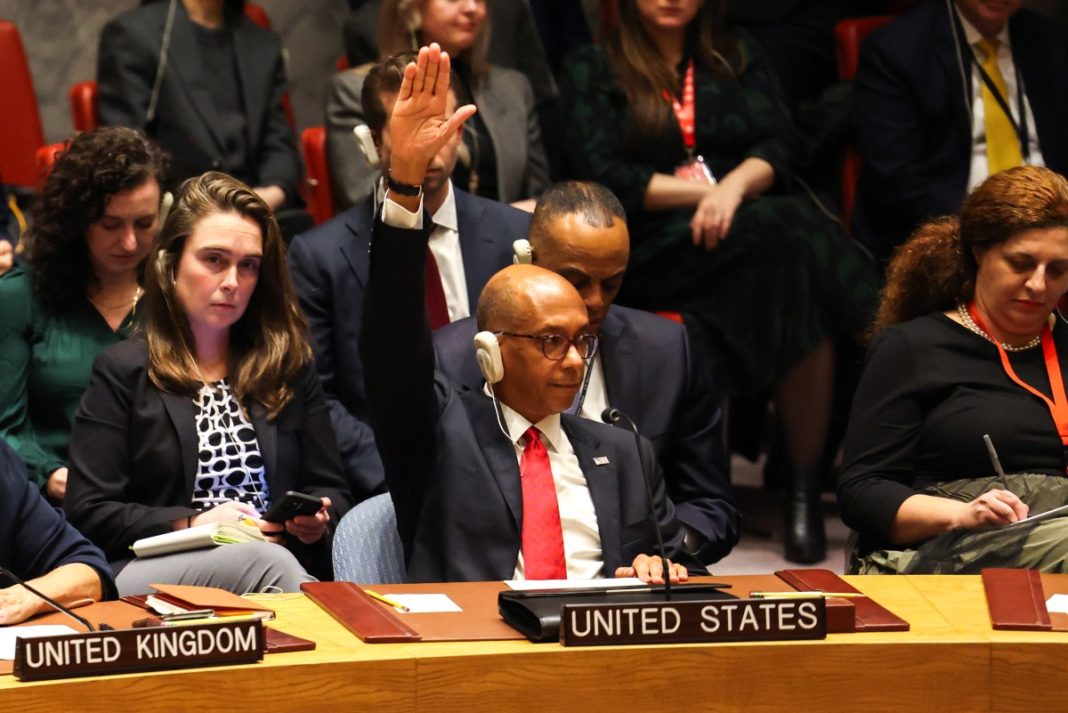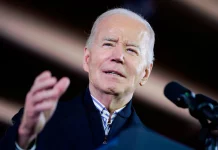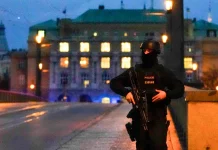UNITED NATIONS — The United States vetoed a United Nations resolution Friday that was supported by almost all other Security Council members and dozens of other nations, demanding an immediate humanitarian cease-fire in Gaza. The resolution’s backers denounced the US stance as a tragic mistake and warned of more civilian casualties and devastation as the war enters its third month.
The vote in the 15-member council was 13-1, with the United Kingdom abstaining. The US was the only country to oppose the resolution, reflecting a growing rift between Washington and some of its closest allies over Israel’s prolonged bombardment of Gaza. France and Japan were among those who backed the call for a cease-fire.
The foreign ministers of Egypt, Jordan, the Palestinian Authority, Qatar, Saudi Arabia and Turkey tried to persuade the Biden administration to change its position and support the resolution, but their meeting with Secretary of State Antony Blinken took place only after the U.N. vote.
The vote and the Arab diplomats’ visit shifted the responsibility more firmly onto the US for shielding Israel from increasing pressure to stop the airstrikes that have killed thousands of Palestinian civilians.
“What is the message we are sending Palestinians if we cannot unite behind a call to halt the relentless bombardment of Gaza?” United Arab Emirates deputy ambassador Mohamed Abushaha asked after the vote. “Indeed, what is the message we are sending civilians across the world who may find themselves in similar situations?”
U.S. deputy ambassador Robert Wood called the resolution “imbalanced” and criticized the council after the vote for not condemning Hamas’ Oct. 7 attack on Israel that killed about 1,200 people, mostly civilians, or recognizing Israel’s right to defend itself. He argued that stopping military action would allow Hamas to keep ruling Gaza and “only plant the seeds for the next war.”
“Hamas has no desire to see a durable peace, to see a two-state solution,” Wood said before the vote. “For that reason, while the United States strongly supports a durable peace, in which both Israelis and Palestinians can live in peace and security, we do not support calls for an immediate cease-fire.”
Israel’s military campaign has killed more than 17,400 people in Gaza — 70% of them women and children — and wounded more than 46,000, according to the Palestinian territory’s Health Ministry, which says many others are trapped under rubble. The ministry does not distinguish between civilian and combatant deaths.
Abushaha, the UAE diplomat, said before the vote that the resolution, which his country sponsored, had attracted nearly 100 co-sponsors in less than 24 hours, showing global support for ending the war and saving Palestinian lives.
After the vote, he expressed deep disappointment at the US veto and warned that the Security Council is becoming isolated and “appears untethered” from its duty to ensure international peace and security.
Ambassador Nicolas De Rivière of France, a permanent council member with veto power who supported the resolution, regretted its lack of unity and appealed “for a new, immediate and lasting humanitarian truce that should lead to a sustainable cease-fire.”
Russia’s deputy U.N. ambassador Dmitry Polyansky called the vote “one of the darkest days in the history of the Middle East” and accused the US of issuing “a death sentence to thousands, if not tens of thousands more civilians in Palestine and Israel, including women and children.”
He said “history will judge Washington’s actions” in the face of what he called a “merciless Israeli bloodbath.”
U.N. Secretary-General invokes Article 99 to warn of Gaza crisis, U.S. vetoes cease-fire resolution
The U.N. Secretary-General Antonio Guterres invoked Article 99 of the U.N. Charter for the first time since 1971 to alert the Security Council of the grave threat to international peace and security posed by the escalating violence in Gaza. He urged the council to demand a humanitarian cease-fire to avert a “humanitarian catastrophe” in the besieged enclave.
Article 99: A rare and powerful tool
Article 99 of the U.N. Charter grants the Secretary-General the authority to bring to the attention of the Security Council any matter that he considers a danger to global stability. Guterres said he used this prerogative because of the “high risk of the total collapse of the humanitarian support system in Gaza”, which could lead to “a complete breakdown of public order and increased pressure for mass displacement into Egypt”.
He warned that Gaza was at “a breaking point” and that its people faced the risk of starvation. He condemned Hamas’ brutality against Israelis on Oct. 7, but also said that it “can never justify the collective punishment of the Palestinian people”. He added that while Hamas’ indiscriminate rocket fire and use of human shields violated the laws of war, Israel was not exempt from its own obligations under international law.
The humanitarian nightmare in Gaza
The Secretary-General gave a grim account of the humanitarian situation in Gaza, where Israeli attacks from air, land and sea have reportedly hit 339 education facilities, 26 hospitals, 56 health care facilities, 88 mosques and three churches. He said that over 60% of Gaza’s housing had been destroyed or damaged, forcing some 85% of the population from their homes. He said that the health system was collapsing and that “nowhere in Gaza is safe”.
The Palestinian U.N. ambassador Riyad Mansour accused Israel of pursuing “the ethnic cleansing of the Gaza Strip” and “the dispossession and forcible displacement of the Palestinian people”. He appealed to the council to support an immediate cease-fire, saying that failing to do so would amount to endorsing “war crimes, crimes against humanity and genocide”. He denounced the U.S. veto of the cease-fire resolution as “disastrous” and “a terrible day for the Security Council”. He vowed to continue seeking “every legitimate avenue to stop these abhorrent atrocities”.
The U.S. stance: No to cease-fire, yes to Israel
Israel’s Defense Minister Yoav Gallant expressed his gratitude to the U.S. for its “bold leadership” and its rejection of the cease-fire proposal. He argued that a cease-fire would reward Hamas, ignore the plight of the hostages held in Gaza, and embolden terror groups everywhere. He urged the world to “stand with Israel in our mission”. He said that Israel was “fighting for our future, and we are fighting for the free world”.
In Washington, Jordan’s Foreign Minister Ayman Safadi told reporters that the killing of Palestinian civilians in Israel’s bombardment and siege of Gaza constituted war crimes and threatened to destabilize the region, the U.S. and the world for years to come. He said that Jordan was witnessing the anger and frustration of its people, who felt that the international community was doing nothing to stop Israel’s massacres. He said that despite Jordan’s efforts, Israel was continuing its aggression.
Amnesty International’s Secretary General Agnès Callamard criticized the U.S. for continuing to supply weapons to Israel “that contribute to the decimation of entire families”. She said that the U.S. had a legal and moral obligation to stop the arms transfers and to hold Israel accountable for its violations. Louis Charbonneau, U.N. director at Human Rights Watch, echoed her sentiment, saying that the U.S. risked complicity in war crimes by providing Israel with weapons and diplomatic cover “as it commits atrocities, including collectively punishing the Palestinian civilian population in Gaza”.





